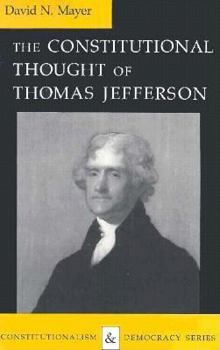Constitutional Thought of Thomas Jefferson (Revised)
(Part of the Constitutionalism and Democracy Series)
Select Format
Select Condition 
Book Overview
In this comprehensive account of Thomas Jefferson's constitutional thought, David N. Mayer offers a fresh perspective on Jefferson's philosophy of government. Eschewing the "liberalism versus civic republicanism" debate that has so dominated early American scholarship in recent years, Mayer examines Jefferson's thought in Jefferson's own terms- as "whig," "federal," and "republican." In the interrelationships and tensions among these three essential...
Format:Paperback
Language:English
ISBN:081391485X
ISBN13:9780813914855
Release Date:September 1995
Publisher:University of Virginia Press
Length:416 Pages
Weight:1.50 lbs.
Dimensions:1.3" x 6.0" x 9.1"
Grade Range:Postsecondary and higher
Customer Reviews
4 ratings
The Constitutional Thought of Thomas Jefferson
Published by Thriftbooks.com User , 14 years ago
This single volume is the most comprehensive study on Thomas Jefferson's view of federalism and the limits of power, ergo simply that the states are everything unto themselves in domestic affairs and united in respect to all foreign concerns. In these pages Jefferson is no enigma, he is well grounded, and a recognizable libertarian even to us today. America is right because Jefferson was! An important addition to any serious admirer of the author of liberty.
The Real Jefferson, Not the Reinvented One
Published by Thriftbooks.com User , 22 years ago
I've always maintained that the best way to understand the founders is to understand them on their on terms. Mayer believes this too and does an excellent job at profiling the constitutional thought of Jefferson and his political philosophy. Too often, shoddy partisan scholarship like that of Richard Matthews gets it quite wrong on the founders. They do so quite purposefully choosing to dwell statically on one quote or episode instead of objectively highlighting the development of their subject. Mayer explains Jefferson on his own terms, as "whig," "federal," and "republican," hence his First Inaugural Address. Jefferson was an adament defender of federalism, state's rights and the Constitution. His alleged "radical egalitarianism" was more than tempered by his mistrust of central government and the huddled urban masses and his rejection of majoritarian tyranny. "Democracy is not practicable beyond the limits of a town," avows Jefferson. Despite his occasional contradictions, his early tenacity of youth and sympathies with the French Revolution, he was a true Whig and a classical republican, and advocate of limited government. He is an enduring founding father who deserves careful study and admiration for his statesmanship.Also recommended: Alexander Hamilton and the Constitution by Clinton Rossiter.
Excellent
Published by Thriftbooks.com User , 25 years ago
This is indeed the finest study of Jefferson's political thought to date. Unlike other authors, Mayer penetrates to the core of Jefferson's political philosophy, revealing him to be fundamentally a "real whig," with emphasis on his distrust of government.
Valuable resource for Thomas Jefferson historians
Published by Thriftbooks.com User , 26 years ago
Having consumed most of the recent volumes on the life and times of our third president, I would have to say that Mayer's book is one of the strongest when it comes to the concrete exploration of his political thought processes.One of the reviewers on the back cover copy says that "Mayer allows Jefferson to speak for himself. This alone would recommend the work." Indeed. This is one of the strengths of the book with its extensive referencing to the words of one of our founding fathers. It also does the same justice to the philosophers and statesmen who influenced Jefferson throughout his life.One of the most interesting aspects of the book is the scholarly analysis of what it meant (to Jefferson) to be a Whig. I was also compelled by the discussion of the whig concept of a government is more republican (small r) if it is founded in jealousy, and not in confidence.Mayer is not reluctant to point to many of Jefferson's overly optimistic or downright naive assumptions on the practical implications of running a government.One area I wished Mayer spent more time exploring was Jefferson's thoughts on bicameralism and separation of powers; and more specifically on the original contention that the Senate served as a break on run away emotions protecting minority interests (to avoid tyranny of the majority that Madison was so fearful of, but not Jefferson).All told, this book is of value for those who admire Jefferson, who are critical of his standing, and for those who quote his examples without really knowing what they are doing.





